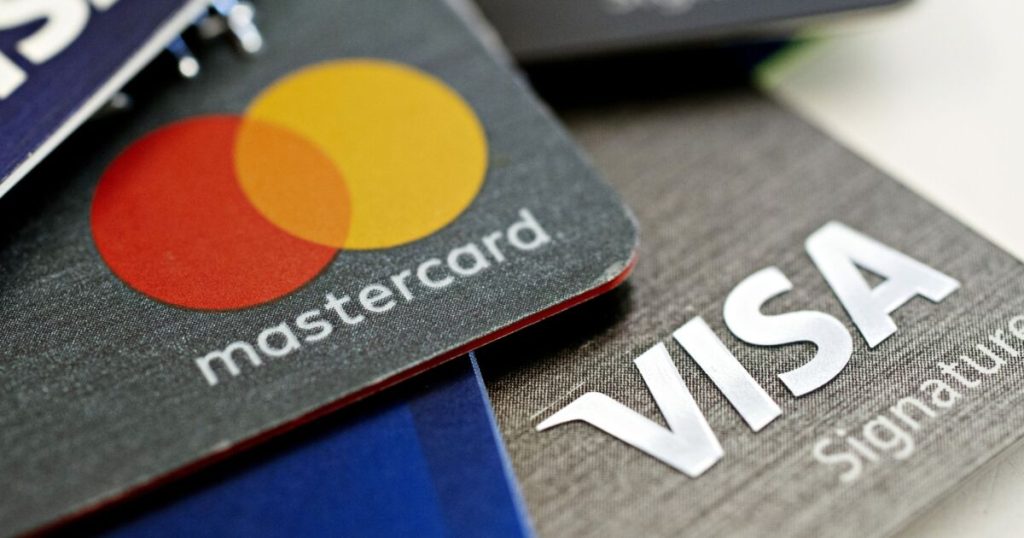Fear over President Donald Trump’s tariffs has become palpable among consumers and corporations, which could cut into a number of activities that payment companies rely on for revenue.
In this environment, PayPal and Visa report earnings on Tuesday and Mastercard reports earnings Thursday, with Wednesday marking the 100th day since the president took office. Trump’s second term has included trade policies that have caused swings in the stock market, while what had been a positive outlook for the
“Uncertainty is never good for spending,” Alenka Grealish, lead for the emerging technology advisory service at Celent, told American Banker. “Tariffs have been a moving target and the response from trading partners is still unknown.”
Cutting back
Survey data suggests consumers are retrenching. Seventy-five percent of publicly traded companies said there would be impact from tariffs in future earnings reports, according to
Eighty percent of consumers view tariffs as a catalyst for inflation, reports
And the
“Negative sentiment impacts discretionary spending,” Grealish said, adding there is a “multiplier effect” that goes deeper than any top-line decline in payment volume. “There has been a deep decline in sentiment, which means there is some very fast processing of what’s going on. That has implications.”
While the major U.S. payment companies reported earnings growth in the fourth quarter of 2024, the fluid nature of the trade war will make it harder to predict performance for the coming year, a key metric for investors, analysts, and the actual firms.
“This is the most unique earnings season set-ups that we’ve been a part of,” said analysts from Jeffries in a research note on the payments industry.
Tough travels
In its report for the quarter endeded March 31, Mastercard is expected to report earnings per share of $3.57, up 7.9% from the prior year, according to Zacks. Visa is projected to report EPS of $2.68 per share, up slightly from the past year.
Analysts said they will be paying attention to what both firms say about the coming year in regards to tariffs, the trade war and the impact on B2B supply chains, cross-border transactions and travel payments.
One of the early impacts of the trade war has been a
Canadian/U.S. land travel fell 32% in March, while air travel fell 14%, according to
A 20% yearly drop drop in travel, Jeffries’ worst-case scenario, would not substantially hurt Visa and Mastercard’s payment revenue, but it would make it harder for the networks to meet growth targets, the analysts said.
Tariff-related impacts on broad consumer spending would likely not show up in March or April payment volume, but there could be pressure later in the year, the Jeffries analysts said.
Visa and Mastercard both earn a growing share of revenue from value-added services, which JPMorgan Chase analysts have said should help protect both networks from tariff-related pressure on consumer spending.
“Though [they will] likely sound a more cautious tone on the macro economy, we do not think there will be enough of a change in the key drivers to warrant cuts to full-year outlooks,” Jeffries said of Visa and Mastercard.
PayPal is expected to report earnings of $1.15 per share, up 18% over the prior year, according to Zacks. PayPal is in the midst of a pivot that is focusing on AI-driven payment technology and blockchain-powered products such as its stablecoin to boost earnings following a slump in 2023 and 2023.
Wells Fargo analysts said PayPal is “particularly exposed” to rate volatility, saying 90% of its revenue is from consumer transactions.
“The rise of macroeconomic risks could make it even harder for PayPal to show meaningful performance in the foreseeable future,” Seeking Alpha wrote in a research note. “The fact that the tariff war with China has dramatically escalated while consumer sentiment plunged to record lows indicates that the macro risks are unlikely to decrease in the foreseeable future.”
Mastercard did not comment and Visa and PayPal did not respond to requests for comment. Mastercard CEO Michael Miebach expressed confidence in current spending trends in an address at the recent Semafor Economic Summit.
Most major U.S. airlines have pulled their

